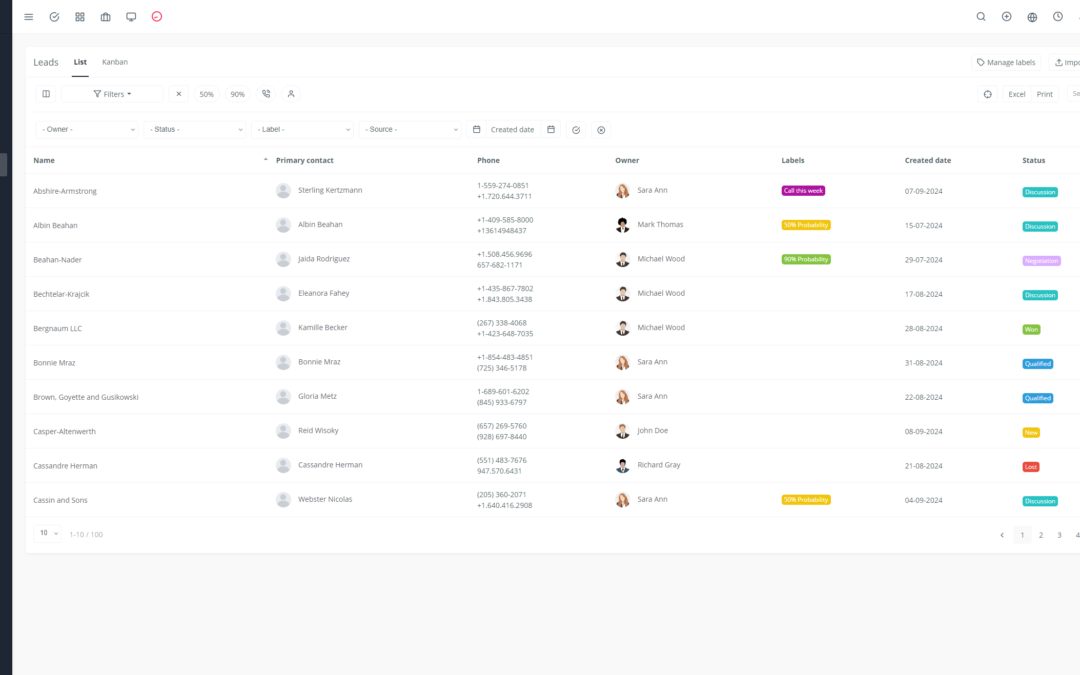In today’s business world, effective customer relationship management is crucial to the success of any company. A CRM with appointment scheduling 🤝 is a valuable tool that helps simplify and optimize this process, enabling you to build lasting relationships and boost your sales.
1. Definition of a CRM with Appointment Scheduling
A CRM with appointment scheduling is software that combines the functionalities of a customer relationship management system (CRM) with an appointment planning and management tool. It allows you to centralize and manage your contacts, leads, appointments, and follow-ups, all in one place.
2. Key Features of a CRM with Appointment Scheduling
A CRM with appointment scheduling offers a wide range of features to help you improve your business operations:
Contact and Lead Management: 📇 Store and organize information about your contacts and leads, such as names, email addresses, phone numbers, notes, and interaction history.
Appointment Scheduling and Automation: 📅 Schedule appointments easily, send invitations via email or SMS, manage availability and reminders, and automate scheduling processes.
Appointment and Result Tracking: 📈 Record notes and key information for each appointment, track results, and analyze performance.
Appointment Scheduling Process Optimization: ⏱️ Improve the efficiency of your appointment scheduling process by automating manual tasks and reducing response time.
Integration with Other Management Tools: 🧩 Integrate the CRM with other essential tools, such as your email, calendar, website, and social media.
3. Benefits of a CRM with Appointment Scheduling for Your Business
A CRM with appointment scheduling can transform your business operations by offering numerous benefits:
Improved Customer Communication: 💬 Provide a personalized and seamless customer experience through effective follow-up and consistent interactions.
Increased Conversion Rate: 📈 Optimize your sales process by identifying and tracking the most promising leads and utilizing personalized sales techniques.
Task and Follow-Up Management: ☑️ Efficiently manage tasks and follow-ups after each appointment to never miss an opportunity.
Performance and Statistical Analysis: 📊 Gain valuable insights into the performance of your sales teams, identify weaknesses, and optimize your strategies.
Enhanced Customer Satisfaction: 😊 Offer an exceptional customer experience by responding to their needs promptly and efficiently.
Access to Valuable Customer Data: 💡 Obtain detailed information about your customers, their purchasing behavior, and preferences.
More Informed Decision-Making: 🧠 Utilize the collected data to make strategic decisions based on concrete information.
Automation of Repetitive Tasks: 🤖 Free up time to focus on higher-value tasks by automating manual tasks.
Reduced Operating Costs: 💸 Reduce costs related to contact management, appointment scheduling, and follow-ups.
Better Organization and Planning: 🗓️ Improve appointment coordination and planning, avoiding schedule conflicts.
Effective Team Collaboration: 🤝 Facilitate collaboration between sales, marketing, and customer service teams.
Improved Sales Team Productivity: 🚀 Increase sales team productivity by simplifying their tasks and providing them with the tools they need to succeed.
Optimization of Resources and Time: ⏳ Maximize the use of your valuable resources and time by automating processes and simplifying tasks.
4. Conclusion
A CRM with appointment scheduling is a valuable investment for any company looking to improve customer relationships, boost sales, and optimize business operations. 🤝📈 By allowing you to centralize information, automate tasks, and analyze performance, a CRM with appointment scheduling will help you achieve your goals and create an exceptional customer experience. 🚀

